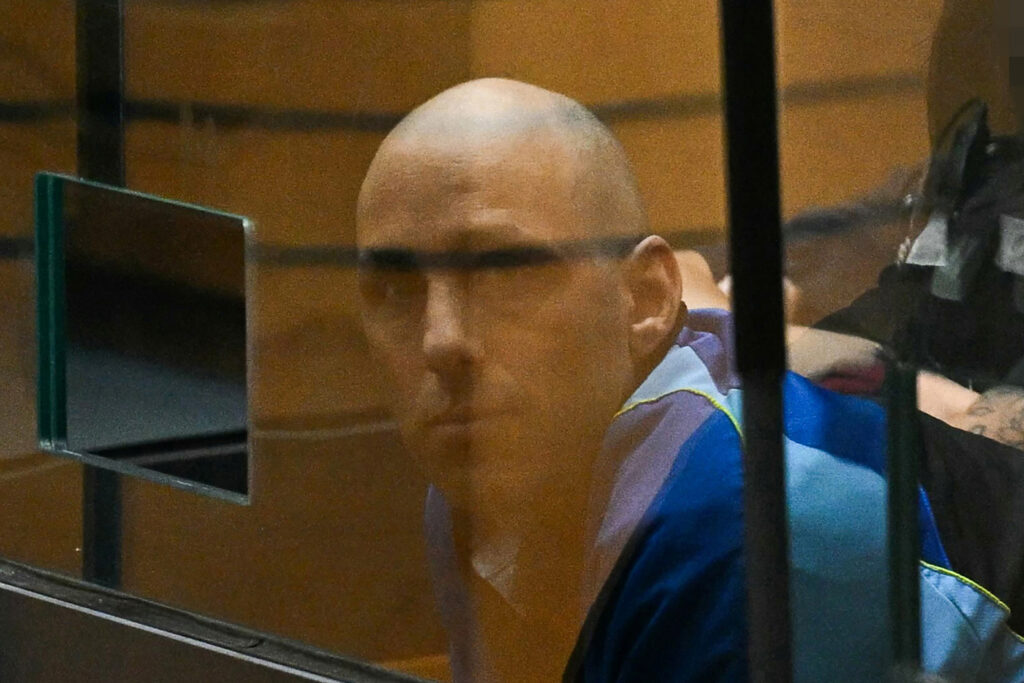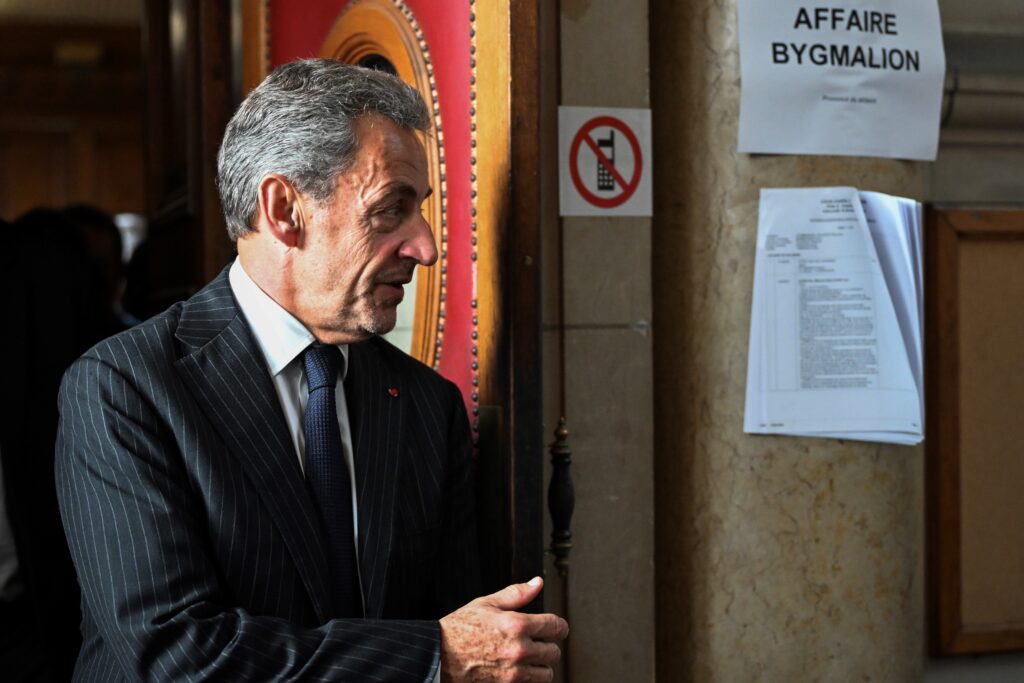A la barre du procès de Cédric Jubillar, une mère qui doute
Ecartelée entre l’amour pour son fils et son inquiétude d’une possible “connerie” de Cédric Jubillar, c’est une mère dans le doute qui témoigne mercredi devant la cour d’assises du Tarn.Dès le lendemain de la soudaine disparition de Delphine Jubillar, fin 2020, la belle-mère de l’infirmière déclarait aux gendarmes: “j’espère juste que mon fils ne lui a rien fait”.Car Cédric lui avait tenu, quelques semaines auparavant, des propos menaçants à l’égard de son épouse qui voulait le quitter, des déclarations que sa mère a rapportées aux enquêteurs: “J’en ai marre, je vais la tuer, je vais l’enterrer, personne ne la retrouvera”. Des paroles en l’air, a martelé le peintre-plaquiste de 38 ans, qui a toujours nié être l’auteur du meurtre dont il est accusé devant les assises du Tarn. Le corps de Delphine n’a pas été retrouvé en plus de quatre ans de recherches. Nadine Jubillar, 54 ans, a été plongée dans l’affaire judiciaire et médiatique dès l’annonce de la disparition de sa belle-fille de 33 ans, quand Cédric l’a appelée, le 16 décembre 2020 au matin, pour venir au domicile du couple à Cagnac-les-Mines, près d’Albi, s’occuper de ses petits-enfants. Six mois plus tard, en juin 2021, la quinquagénaire, un temps soupçonnée de complicité, était placée en garde à vue avec son mari, le beau-père de Cédric, en même temps que son fils, auquel elle a été confrontée notamment sur les menaces de mort qu’il a proférées à l’encontre de Delphine. Si le fils a été mis en examen et écroué, la mère n’a pas été inquiétée au sortir de sa garde à vue. Elle sera néanmoins interrogée mercredi sur sa participation au “flicage” de la jeune infirmière par son mari, qui cherchait à trouver les traces d’une relation extraconjugale. Elle a reconnu en particulier avoir tenté de géolocaliser sa belle-fille avant sa disparition.- Partie civile -Son audition, au 11e jour du procès qui en compte 18, est d’autant plus attendue que la mère de l’accusé est désormais partie civile, en quête de vérité pour ses petits-enfants, Louis et Elyah, “pour pouvoir continuer à les regarder droit dans les yeux”, selon un document judiciaire.Si elle voulait croire, au début de l’enquête, à l’innocence de Cédric, “un homme idéal, un mari idéal, un père idéal”, Nadine Jubillar a admis à l’instruction ne pas vraiment connaître son fils, qu’elle a eu à l’âge de 16 ans puis abandonné aux services sociaux. Jusqu’à lâcher sur une radio locale être “persuadée de la culpabilité” de son fils.Quelle sera la teneur de son témoignage mercredi? Interrogée à la veille de l’audition, son avocate Géraldine Vallat n’a pas souhaité répondre, réservant à Nadine Jubillar le soin de s’exprimer. “C’est une mère qui s’exprime, donc c’est une mère avec ses complexités, elle est dans un conflit de loyauté absolu et donc évidemment on attend simplement qu’elle puisse s’exprimer dans les meilleures conditions. Evidemment ça ne va pas être facile”, a estimé un autre avocat des parties civiles, Mourad Battikh.La mère de Cédric sera sans aucun doute amenée à parler de ses relations courtoises mais distantes avec sa belle-fille ou encore de l’enfance de l’accusé, ballotté de foyers en familles d’accueil, puis des liens ravivés sur le tard alors que son aîné était déjà père, marié avec Delphine.Son mari, le beau-père de Cédric, sera également entendu mercredi. Il est réputé avoir été sévère, parfois violent, à l’égard de l’accusé lorsqu’il était adolescent. La cour d’assises se penchera également sur l’audition d’un des anciens codétenus de Cédric Jubillar auquel l’accusé avait confié en prison avoir “vrillé” et tué son épouse, avant de démentir. Cet homme devrait être absent à l’audience.
Wildlife flee as floods swamp Indian parks
A herd of elephants, along with tigers and leopards, have escaped after raging floods in India submerged two of West Bengal’s famed wildlife sanctuaries, state officials said Wednesday.Since October 3, at least 36 people have been killed in floods and landslides across the state, as days of torrential rain destroyed hundreds of homes, washed away tea estates, and left roads impassable.The deluge also swamped large parts of Gorumara and Jaldapara national parks, protected reserves in the Himalayan foothills that shelter elephants, bison, tigers, and the endangered one-horned rhinoceros.”The two wildlife sanctuaries… have been submerged under floodwater forcing the animals to stray out,” West Bengal forest minister Birbaha Hansda told AFP.”A herd of 30 elephants strayed out and were seen running through water, trumpeting loudly… We don’t know how many elephants will survive,” she said.A leopard was spotted “negotiating choppy water”, she said, but has not been seen since.Other animals could not escape.”The carcasses of dead animals have started emerging on the riverbanks,” she said, listing two leopards, a rhino and several bison and deer among the dead.Some rescues were successful.”Two captive elephants were brought to pull out an adult rhino and two elephant calves stuck on a river bank,” she added.India’s one-horned Asian rhino population has almost tripled in the past four decades thanks to conservation and anti-poaching efforts, from 1,500 four decades ago to more than 4,000 today.
Les Bourses européennes orientées en légère hausse à l’ouverture
Les Bourses européennes ont ouvert en légère hausse mercredi, l’attention restant sur la France, engluée dans une crise politique historique et dont le Premier ministre démissionnaire Sebastien Lecornu tente d’ultimes négociations.Dans les premiers échanges, la Bourse de Paris était en légère hausse de 0,22%, Londres de 0,33%, tandis que Francfort restait stable (-0,04%).
La Cour de cassation examine le pourvoi de Sarkozy dans l’affaire Bygmalion
La Cour de cassation examine mercredi le pourvoi de Nicolas Sarkozy contre sa condamnation dans l’affaire Bygmalion, un ultime recours judiciaire dans ce dossier presque occulté par le séisme de l’incarcération prochaine de l’ex-président.Si la Cour de cassation rejette le pourvoi, comme le préconise l’avocate générale selon une source proche du dossier, l’affaire Bygmalion deviendra la deuxième condamnation pénale définitive au casier judiciaire de Nicolas Sarkozy, après celle de l’affaire des écoutes.L’ancien chef de l’État (2007-2012) est revenu au premier plan de l’actualité il y a deux semaines avec sa condamnation en première instance à Paris dans le procès libyen à cinq ans d’emprisonnement ferme, assorti d’un mandat de dépôt avec exécution provisoire, c’est-à-dire immédiate. Bien qu’ayant fait appel, il sera donc prochainement incarcéré, une première dans l’histoire de la République.Dans l’affaire Bygmalion, Nicolas Sarkozy a été condamné le 14 février 2024 par la cour d’appel de Paris à un an d’emprisonnement dont six mois ferme pour le financement illégal de sa campagne présidentielle de 2012.Cette peine, suspendue par le pourvoi en cassation, et dont la cour d’appel avait ordonné l’aménagement pour la partie ferme (bracelet électronique, semi-liberté…), était légèrement inférieure à celle d’un an d’emprisonnement ferme prononcée en première instance en 2021.Dans ce dossier, les investigations ont révélé que pour masquer l’explosion des dépenses de sa campagne – près de 43 millions d’euros pour un maximum autorisé de 22,5 millions -, un système de double facturation avait été mis en place imputant à l’UMP (devenu LR), sous couvert de conventions fictives, une grosse partie du coût des meetings.Contrairement à ses coprévenus, l’ex-chef de l’Etat n’était pas mis en cause pour ce système de fausses factures, mais comme bénéficiaire, en tant que candidat, d’un financement politique illégal.En première instance comme en appel, Nicolas Sarkozy avait contesté “vigoureusement toute responsabilité pénale”, dénonçant “fables” et “mensonges”.- Bracelet électronique -Selon une source judiciaire, la chambre criminelle de la Cour de cassation examinera en formation de section, dite “ordinaire”, le pourvoi de Nicolas Sarkozy, défendu par Me Patrice Spinosi, qui n’a pas souhaité s’exprimer avant l’audience.Composée d’au moins cinq magistrats, la formation de section est appelée à trancher “lorsque la réponse à apporter à la question juridique posée ne présente pas une complexité particulière ou une forte sensibilité, mais, pour autant, ne se dessine pas de façon évidente”, selon le site de la Cour de cassation. La décision sera mise en délibéré.Trois des dix condamnés en appel du procès Bygmalion se sont joints au pourvoi: le directeur de campagne Guillaume Lambert et les ex-cadres de l’UMP Eric Cesari et Pierre Chassat.Si elle reconnaissait le bien-fondé de leur requête, la Cour de cassation, qui juge le seul respect du droit et non le fond des dossiers, pourrait ordonner un nouveau procès dans cette affaire.En décembre 2024, la plus haute juridiction de l’ordre judiciaire français avait déjà rendu définitive la condamnation de Nicolas Sarkozy à un an d’emprisonnement ferme sous bracelet électronique pour corruption et trafic d’influence dans l’affaire des écoutes, également appelée Bismuth.L’ancien champion de la droite, 70 ans, l’a porté entre février et mai, avant l’obtention d’une libération conditionnelle avant mi-peine, notamment en raison de son âge.M. Sarkozy a par ailleurs un autre rendez-vous crucial avec la justice, le 13 octobre: il est convoqué par le parquet national financier pour connaître les modalités de son incarcération.Sitôt écroué, sa défense pourra déposer une demande de mise en liberté.Son appel du jugement qui l’a déclaré coupable d’association de malfaiteurs pour avoir laissé ses proches démarcher la Libye de Mouammar Kadhafi en vue d’un financement illégal de sa campagne présidentielle de 2007 – non concrétisé, selon la justice – ouvre droit à un nouveau procès, qui doit se tenir dans les prochains mois.




